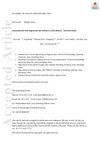 1514 citations,
December 2011 in “Fertility and sterility”
1514 citations,
December 2011 in “Fertility and sterility” Experts agree that PCOS affects women's health in complex ways, but more research is needed to understand and treat it effectively.
 271 citations,
May 2019 in “Cells”
271 citations,
May 2019 in “Cells” The secretome from mesenchymal stem cells is a promising treatment that may repair tissue and avoid side effects of stem cell transplantation.
 37 citations,
May 1999 in “Australasian Journal of Dermatology”
37 citations,
May 1999 in “Australasian Journal of Dermatology” Early diagnosis and treatment are crucial for preventing permanent hair loss in various scalp conditions, and while new treatments are promising, more research is needed to evaluate their effectiveness.
 July 2020 in “bioRxiv (Cold Spring Harbor Laboratory)”
July 2020 in “bioRxiv (Cold Spring Harbor Laboratory)” The structure of SRD5A reveals how it reduces steroids, aiding drug design for related health conditions.
13 citations,
April 2019 in “International journal of molecular sciences” Acyzol could help treat conditions caused by zinc deficiency.
 March 2023 in “Revista română de reumatologie”
March 2023 in “Revista română de reumatologie” Skin problems are common in lupus, often appearing first, with various types and treatments, and careful monitoring is important for diagnosis and management.
 45 citations,
January 2006 in “Endocrine journal”
45 citations,
January 2006 in “Endocrine journal” To diagnose Polycystic Ovarian Syndrome, two out of three signs—irregular periods, high male hormone levels, or cysts on the ovaries—are needed.
 19 citations,
January 2016 in “Dermatology Research and Practice”
19 citations,
January 2016 in “Dermatology Research and Practice” The study concluded that hair loss in Indian women is not significantly linked to anemia or thyroid problems, but checking thyroid function could help those with ongoing hair loss.
 1 citations,
June 2019 in “Innovare journal of medical sciences”
1 citations,
June 2019 in “Innovare journal of medical sciences” Polycystic Ovary Syndrome (PCOS) is a hormonal disorder in women that can cause infertility and other health issues, and it may be improved by treatments that increase insulin sensitivity.
 5 citations,
March 2001 in “Clinics in Dermatology”
5 citations,
March 2001 in “Clinics in Dermatology” Diagnose and manage hair issues in women by checking medical conditions and using personalized treatments.
 51 citations,
October 2002 in “British Journal of Dermatology”
51 citations,
October 2002 in “British Journal of Dermatology” Finasteride increases hair density in female androgenetic alopecia, but individual results may vary.
 50 citations,
November 2010 in “Plastic and Reconstructive Surgery”
50 citations,
November 2010 in “Plastic and Reconstructive Surgery” Botox increased hair count in men with baldness and might work by improving scalp blood flow.
 April 2023 in “Dermatologica Sinica”
April 2023 in “Dermatologica Sinica” Sex hormones affect hair growth and loss, and treatments for related hair diseases include various medications, hair transplantation, and light therapy.
 21 citations,
January 2022 in “Biomaterials Science”
21 citations,
January 2022 in “Biomaterials Science” RNA delivery is best for in-body use, while RNP delivery is good for outside-body use. Both methods are expected to greatly impact future treatments.
 May 1993 in “Current problems in dermatology”
May 1993 in “Current problems in dermatology” Skin symptoms are important for diagnosing infections in children.
1 citations,
January 2015 in “International Journal of Pediatrics and Adolescent Medicine” Cyclosporine-A can cause excessive hair growth, which usually stops after discontinuing the drug.
 12 citations,
March 2015 in “Pediatric Dermatology”
12 citations,
March 2015 in “Pediatric Dermatology” Early diagnosis and treatment of PCOS in young people is important to prevent long-term health problems.
 15 citations,
January 1971 in “British Journal of Dermatology”
15 citations,
January 1971 in “British Journal of Dermatology” Hair can indicate early signs of metabolic disorders, with issues like protein deficiency stopping hair growth.
 4 citations,
June 2002 in “Clinical and experimental dermatology”
4 citations,
June 2002 in “Clinical and experimental dermatology” Effective treatment for hidradenitis suppurativa varies, with antibiotics commonly used and surgery as an option, but no single method is universally successful.
 77 citations,
May 2012 in “Expert Opinion on Emerging Drugs”
77 citations,
May 2012 in “Expert Opinion on Emerging Drugs” New treatments for male hypogonadism are effective and should be personalized.
 12 citations,
June 2016 in “Reviews in Endocrine and Metabolic Disorders”
12 citations,
June 2016 in “Reviews in Endocrine and Metabolic Disorders” Some skin diseases and their treatments can negatively affect male fertility.
 1 citations,
February 1999 in “Journal of Paediatrics and Child Health”
1 citations,
February 1999 in “Journal of Paediatrics and Child Health” The document concludes that each reviewed medical book is useful for its specific area in pediatric care, especially the "Neonatal Formulary" for neonatal drug information.
 56 citations,
October 2018 in “Journal of The American Academy of Dermatology”
56 citations,
October 2018 in “Journal of The American Academy of Dermatology” Androgens play a complex role in skin conditions like acne and hair loss in women, and normal blood levels don't always show true androgen status.
 10 citations,
August 2016 in “Anais brasileiros de dermatologia/Anais Brasileiros de Dermatologia”
10 citations,
August 2016 in “Anais brasileiros de dermatologia/Anais Brasileiros de Dermatologia” Vitiligo patients often have nail problems, so checking their nails is important.
11 citations,
December 2017 in “Orphanet Journal of Rare Diseases” A new mutation in the ST14 gene broadens the understanding of ichthyosis-hypotrichosis syndrome.
January 2024 in “Metabolites” Standardized procedures are crucial for collecting and preparing biological samples to ensure accurate clinical metabolomics results.
 12 citations,
May 2019 in “The journal of pharmacology and experimental therapeutics/The Journal of pharmacology and experimental therapeutics”
12 citations,
May 2019 in “The journal of pharmacology and experimental therapeutics/The Journal of pharmacology and experimental therapeutics” Activating TRPV3 channels stops hair growth by killing hair follicle cells.
 9 citations,
October 2012 in “Frontiers of Hormone Research”
9 citations,
October 2012 in “Frontiers of Hormone Research” Antiandrogens are the main treatment for hirsutism, with individualized care and safe, affordable options needed.
 5 citations,
July 2018 in “Experimental Dermatology”
5 citations,
July 2018 in “Experimental Dermatology” The "Punch Assay" can regenerate hair follicles efficiently in mice and has potential for human hair regeneration.
 13 citations,
November 2013 in “Journal of Endocrinology/Journal of endocrinology”
13 citations,
November 2013 in “Journal of Endocrinology/Journal of endocrinology” Vitamin D receptor helps control hair growth genes in skin cells.

























